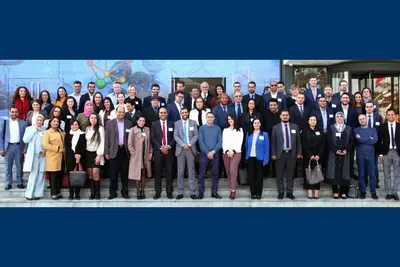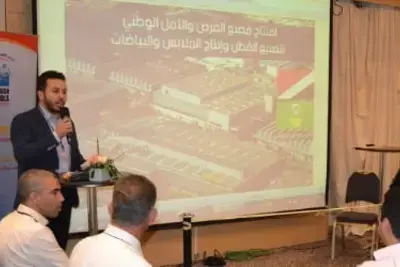
Success Story
Modest Steps Can Increase Transparency of Algerian Elections, NDI Delegation Finds
With elections just five weeks away, Algerian electoral authorities and other political actors still have time to implement measures that can enhance the transparency of the country’s May 10 parliamentary elections, according to a report released today by an international pre-election assessment delegation organized by NDI.
The delegation, which began its evaluation on March 31 and concluded today, is part of an international election observation mission organized by NDI at the invitation of the Algerian government.
The delegation’s objectives were to express the international community’s support for democratic governance and competitive multiparty elections in Algeria, and to provide Algerians with an impartial and accurate report on the electoral process.
The delegation recognized numerous positive aspects of the pre-electoral environment. New supervisory institutions, invitations for international observers, and quotas for women’s representation “can be seen as indicators of increased political will to organize more open and competitive elections,” said delegation member Sarah Johnson of the Carter Center.
At the same time, the delegation’s statement noted several challenges at this stage in the electoral process. “A number of regulations and procedures remain vague or undetermined,” said delegation member Anis Ghodbane of the Association Tunisienne pour l’Eveil Démocratique. Individuals with whom the delegation met raised a number of complaints about irregularities in the voter registry, the role and responsibilities of newly established supervisory commissions, and complications in candidate registration.
In addition, Mr. Ghodbane noted, “Despite invitations to international observers, no provisions currently exist for accreditation of nonpartisan domestic observers from Algerian civil society, despite their requests.” The vote tabulation process is a particular area where citizen observation could lend considerable credibility to the electoral process, the delegation noted.
In the wake of the Arab Spring and a new reform process, “Algerians desire genuine change,” said delegation member Carole James, member of the legislative assembly of British Columbia in Canada. Yet, she noted, citizens seem skeptical that new legal provisions alone will increase the transparency of the contest or produce a more credible parliament capable of significantly influencing the reform process. But, delegation member Irena Hadziabdic, president of the European Association of Election Officials, noted that steps can be taken today to “increase public faith in these elections and in Algeria’s political process more broadly."
In its report, the delegation recommended a number of steps to increase transparency and encourage public confidence in the elections, including:
- Authorities should open the entire vote tabulation process to all types of observers, including domestic observers, political party agents, and international observers, to dissuade broad concerns that this step of the process is susceptible to manipulation.
- Electoral authorities should permit Algerian civil society to organize observation initiatives, should clarify the accreditation process, and should disseminate the information widely and in a timely manner.
- Political parties and citizens should take advantage of opportunities to maximize transparency, for example by attending the counting of ballots and the publication of results at polling stations.
- Outstanding regulations should be published and procedural ambiguities clarified as quickly as possible by the election authorities, in open partnership with the National Commissions for Election Supervision and Election Monitoring.
- Election authorities should clarify how the allocation of seats will be made for women in order to ensure that the proportional results intended by the law are achieved in an equitable manner.
- Political parties should strive to earn the trust of voters through responsive platforms and voter outreach efforts, and maximize participation of youth and women in campaigns.
The delegation included: Carole James of Canada, member of the legislative assembly of British Columbia; Irena Hadziabdic of Bosnia and Herzegovina, president of the European Association of Election Officials; Anis Ghodbane of Tunisia, vice president of communications for l’Association Tunisienne pour l’Eveil Démocratique; Sarah Johnson of the U.S., assistant director of the democracy program at The Carter Center; and Jeffrey England of the U.S., NDI resident director in Morocco.
In Algiers, the delegates met with political party representatives and independent candidates; electoral authorities; the National Commissions for Electoral Supervision and Monitoring; civil society leaders; academics; the media; and representatives of the international community. Delegation members also traveled to the provinces of Chlef and Tizi Ouzou to meet with political party leaders, candidates, members of the election supervision commission, and other activists.
NDI’s pre-election mission will be followed by the deployment of long-term observers, who will remain in Algeria through election day and the immediate post-election period.
All elements of the mission are conducted in accordance with Algerian law and international standards for election observation established in the Declaration of Principles for International Election Observation.
On behalf of NDI, Mr. England thanked the Algerian government and the Algerian people for their invitation to observe these elections. He noted that, “All recommendations are offered in the spirit of international cooperation, and in the hope of supporting and strengthening Algeria’s democratic processes and institutions.”
Read more:
Published April 9, 2012



